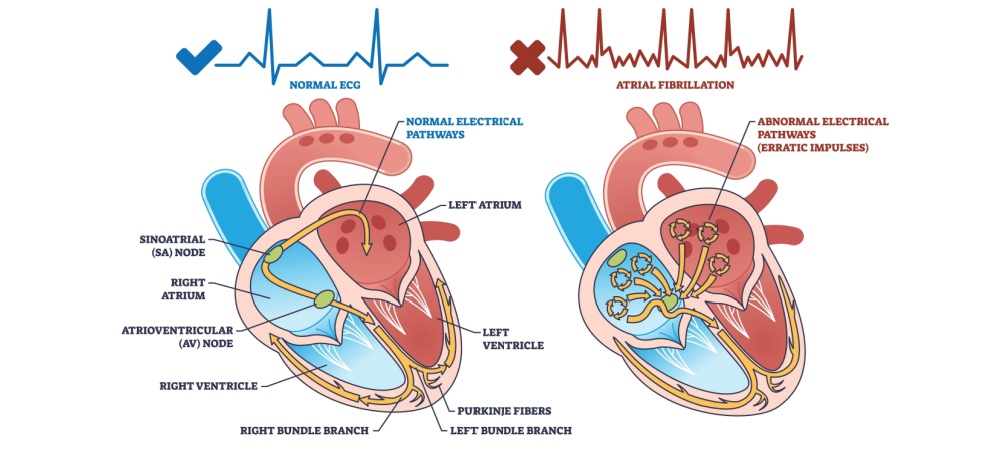What is Atrial Fibrillation (Heart Rhythm Disorders)? What are the Symptoms?
Atrial fibrillation (Afib) is an irregular heart rhythm that starts in the upper chambers of the heart (atria). Afib is one of the most common arrhythmias. Normally, the heart rhythm beats in a regular and coordinated way, but in the case of atrial fibrillation, this rhythm is disrupted. This occurs when the atria are filled with uncontrolled electrical impulses, causing irregularities in the electrical signals transmitted to the lower chambers of the heart (ventricles). Atrial fibrillation usually occurs due to factors such as aging, high blood pressure and heart disease. Symptoms include fatigue, heart palpitations, difficulty breathing and dizziness. Risk factors can include conditions such as high blood pressure, coronary artery disease and obesity. Treatment options include medications, blood thinners and in some cases interventional procedures such as electrical cardioversion or ablation. Untreated Afib can lead to paralysis.
What is Atrial Fibrillation (Heart Rhythm Disorders)?
Atrial fibrillation is a common heart rhythm disorder that occurs when the atrium, one of the upper chambers of the heart, vibrates or contracts irregularly and rapidly. In atrial fibrillation, the normal cycle of electrical impulses in the heart is interrupted. This leads to a fast, chaotic heart rhythm and poor movement of blood from the atria to the lower chambers (ventricles). In people with this condition, the heart beats irregularly and sometimes much faster than normal. Also, the upper and lower chambers of the heart do not work together as they should. When this happens, the lower chambers do not fill completely or pump enough blood to the lungs and body. This can cause the patient to experience distinctive symptoms such as dizziness, tiredness and heart palpitations. They may occur for short periods of time or the discomfort may persist for longer. Treatment is very important as it can put the patient at risk of stroke and other heart conditions. It is therefore important to learn about the symptoms and talk to the specialist about personal risk factors.
What are the Symptoms of Atrial Fibrillation?
Some people with Afib may have no symptoms at all. This depends on how fast the heart ventricles are beating. If the ventricles are beating at a normal or slightly faster rate, patients will usually probably not feel anything. However, if the ventricles beat faster, the symptoms become more pronounced. It is also important to keep a list of when symptoms occur and to share this information with the doctor as soon as possible. Some heart rhythm disorder symptoms may include
- Heart palpitations
- Extreme fatigue
- An irregular heartbeat
- Palpitations (heart palpitations or feeling like racing)
- Dizziness or vertigo.
- Fainting (syncope)
- Shortness of breath
- Chest pain (angina)
If left untreated, Afib can lead to serious complications such as
- Paralysis
- Heart failure
- Blood clots
- Sudden cardiac arrest (SCA)
- Cognitive impairment and dementia
What Causes Atrial Fibrillation?
The most common cause of atrial fibrillation is problems with the structure of the heart. Causes of atrial fibrillation may include
- A congenital heart problem
- A problem with the pacemaker
- Sleep disorder called obstructive sleep apnea
- Heart attack
- Heart valve disease
- High blood pressure
- Lung diseases including pneumonia
- Narrowing or blockage of the arteries, called coronary artery disease
- Overactive thyroid and similar diseases
- Infections caused by viruses
What are the Risk Factors of Atrial Fibrillation?
The risk of the disease may increase with age. Therefore, it is important to know the risk factors and to check with a doctor. It is important for people at risk to have their heart and pulse function checked regularly for early detection.
- Age: The risk of afib increases with age. It is especially more common in people aged 60 and over.
- Caffeine, smoking, alcohol, nicotine or harmful substances: Caffeine, smoking, alcohol, nicotine or harmful substances can cause the heart to beat faster. This can lead to more serious heart arrhythmias.
- Changes in mineral levels: Minerals in the blood, such as potassium, sodium, calcium and magnesium, are involved in the regular functioning of the heart. Irregular levels of these minerals can contribute to heart arrhythmias.
- Heart diseases: Heart disease, especially coronary artery disease, valvular heart disease, heart muscle disease and heart surgery can increase the risk of atrial fibrillation.
- High blood pressure: Having high blood pressure can negatively affect cardiovascular health and increase the risk of atrial fibrillation. Over time, high blood pressure can cause parts of the heart to harden and thicken. Stiffening or thickening of the heart tissues can change the way heartbeat signals pass through the heart.
- Other diseases: Conditions such as diabetes, chronic kidney disease or lung disease can damage the heart vessels and nervous system, which can increase the risk of atrial fibrillation.
- Certain medicines and supplements: Some prescription medicines and over-the-counter cough and cold medicines can cause irregular heartbeats.
- Sleep Apnea: Sleep apnea leads to breathing pauses during sleep, which can increase the risk of atrial fibrillation.
- Thyroid disease: Having an overactive thyroid gland can cause an irregular heartbeat.
- Obesity: Being overweight or obese can negatively affect heart health, increasing the risk of atrial fibrillation.
- Family history: Genetic predisposition can affect the development of the condition. In people with a family history of atrial fibrillation, atrial fibrillation may increase the risk.
How is Atrial Fibrillation Diagnosed?
To diagnose atrial fibrillation, the doctor first takes the patient’s history. Dietary habits and physical activity, family history, symptoms and risk factors are examined. The doctor will then give the patient a physical examination, which includes
- Listening to your heart rhythm with a stethoscope
- Checking your pulse and blood pressure
- Checking the size of your thyroid gland to identify thyroid problems
- Look for swelling in your feet or legs to identify heart failure
- Listening to your lungs to detect heart failure or infection
In addition to a physical examination, the following tests may be ordered by the doctor to help with the diagnosis. These tests may include:
- Electrocardiogram (ECG): An ECG is usually the first test method chosen by the doctor. It is painless and can be done in about three minutes. It measures and records the heart’s electrical signals and can give the doctor information about whether your heart is beating normally.
- Echocardiogram (ECHO): An ECHO involves the use of ultrasound technology to show the movement of the heart. It can reveal problems with blood flow and heart muscle contractions.
- Blood tests: Sometimes imbalances in the blood can cause discomfort. Simple blood tests can show your potassium and thyroid hormone levels.
In some cases, the doctor may also want to check how the heart works in everyday life. In this case, the patient may be asked to wear a portable medical device to record cardiac activity.
How is Atrial Fibrillation Treated?
The main goals of Afib treatment are mostly to control your heart rate, restore normal heart rhythm and reduce the risk of having a stroke. Depending on the symptoms, the doctor may often prescribe medication to see if it helps. Heart rhythm disorder treatment may include
- Drug treatment: Doctors usually prescribe antiarrhythmic drugs to control atrial fibrillation. These medicines can help regulate the heartbeat and reduce symptoms. Blood thinners may also be prescribed, which can prevent blood clots and reduce the risk of stroke.
- Electrical cardioversion: This procedure uses an electric shock that is controlled by doctors to bring the heart back to a regular rhythm, usually in cases that do not respond to medication or in emergencies.
- Catheter ablation: Ablation is a procedure that involves surgically destroying the abnormal heart tissue that is the source of atrial fibrillation. This procedure can be effective in controlling irregular heartbeats and can reduce symptoms.
- Pacemaker or implantable cardioverter-defibrillator (ICD): In some cases, devices such as a pacemaker or ICD can be surgically implanted to help regulate heart rhythm or correct irregular heartbeats.
- Maze procedure: The maze procedure, a type of heart rhythm disorder surgery, involves the creation of scar tissue in a labyrinthine pattern that blocks abnormal signals. The maze-like pattern created prevents abnormal signals from passing through but allows normal heartbeat signals to pass through. This procedure has a very high success rate.
- Lifestyle changes: Healthy lifestyle choices play an important role in the treatment of atrial fibrillation. These changes include regular exercise under the supervision of a doctor, stress management, healthy eating, avoiding smoking, alcohol and harmful substances.
Frequently Asked Questions
What Causes Atrial Fibrillation?
Atrial fibrillation causes irregular and rapid heartbeats, preventing the heart chambers (atria) from working effectively. This can disrupt the normal flow of blood and increase the risk of stroke by increasing clot formation. In addition, the long-term presence of atrial fibrillation can lead to serious heart problems such as heart failure.
Who Has Atrial Fibrillation?
Atrial fibrillation is usually more common in older people, However, people of any age group with risk factors such as hypertension, heart disease, diabetes, obesity can also develop atrial fibrillation.
Is Atrial Fibrillation Dangerous?
Atrial fibrillation is a condition that can lead to serious health problems. Irregular heartbeats can increase the risk of blood clots forming, which can increase the risk of stroke. It can also cause other heart problems, such as heart failure, if left untreated for a long time.
How Does the Heart Work in Atrial Fibrillation?
In atrial fibrillation, the atria, the upper chambers of the heart that should normally beat in coordination, contract or vibrate irregularly and rapidly. This disrupts the heart’s rhythm and heart rate. Disrupted heart rhythm can prevent the blood from being pumped regularly.
Which Department Treats Heart Rhythm Disorder?
Heart rhythm disorders are usually diagnosed and treated by cardiologists. Cardiologists evaluate the patient’s medical history and symptoms to determine how to diagnose and treat heart rhythm disorders.
How Many Minutes Does Atrial Fibrillation Last?
The duration of atrial fibrillation varies from person to person and according to the type of attack. In some patients it lasts only a few minutes, while in others it can last for hours, days or even months. The duration of atrial fibrillation depends on many factors, but treatment and control of the heart rhythm can often help shorten the duration of episodes.


